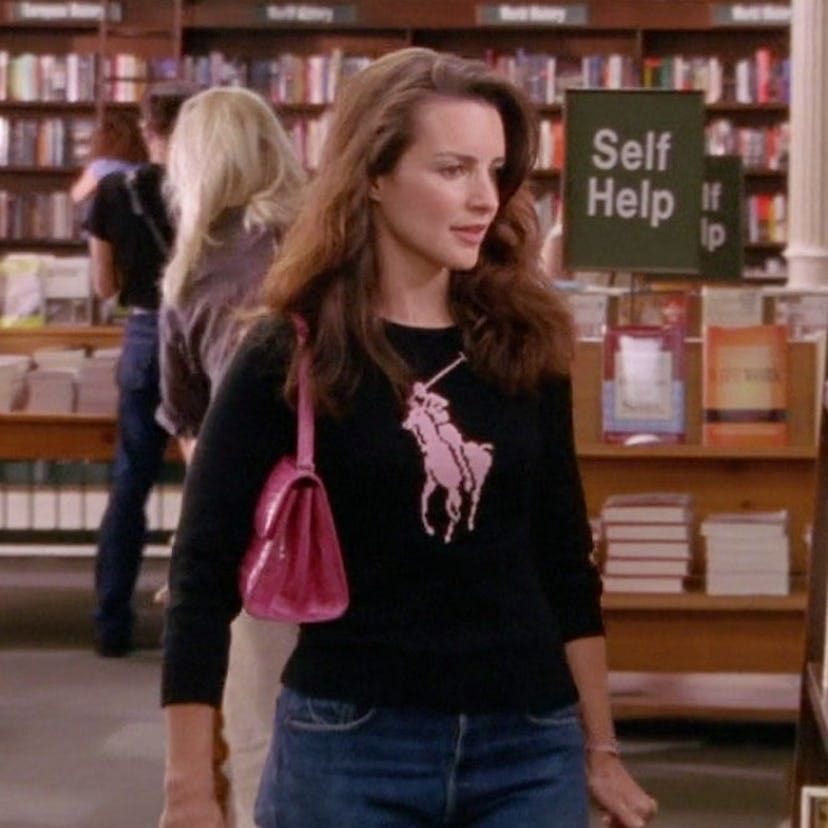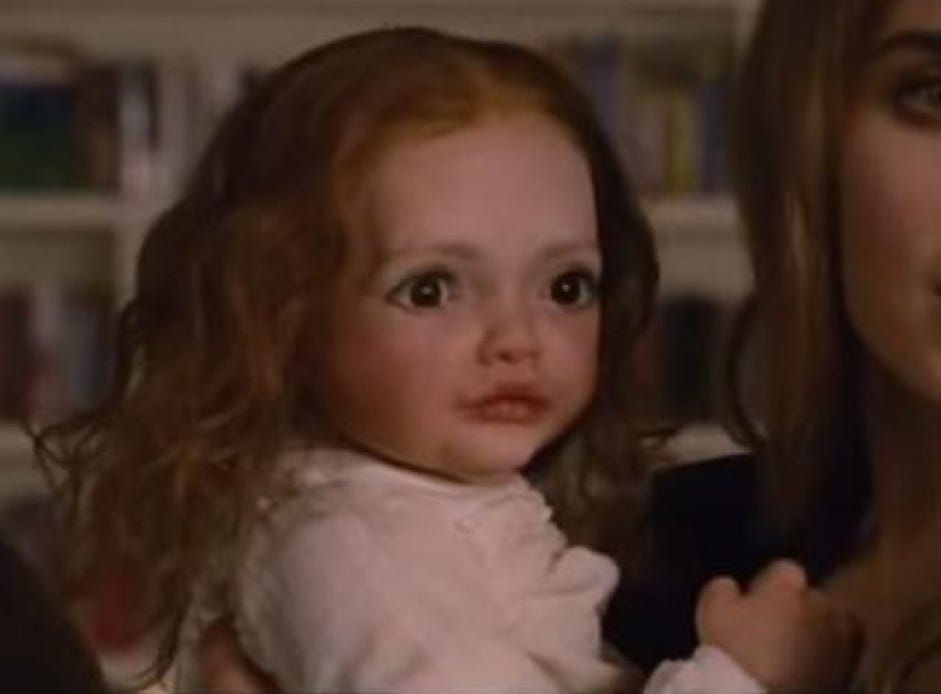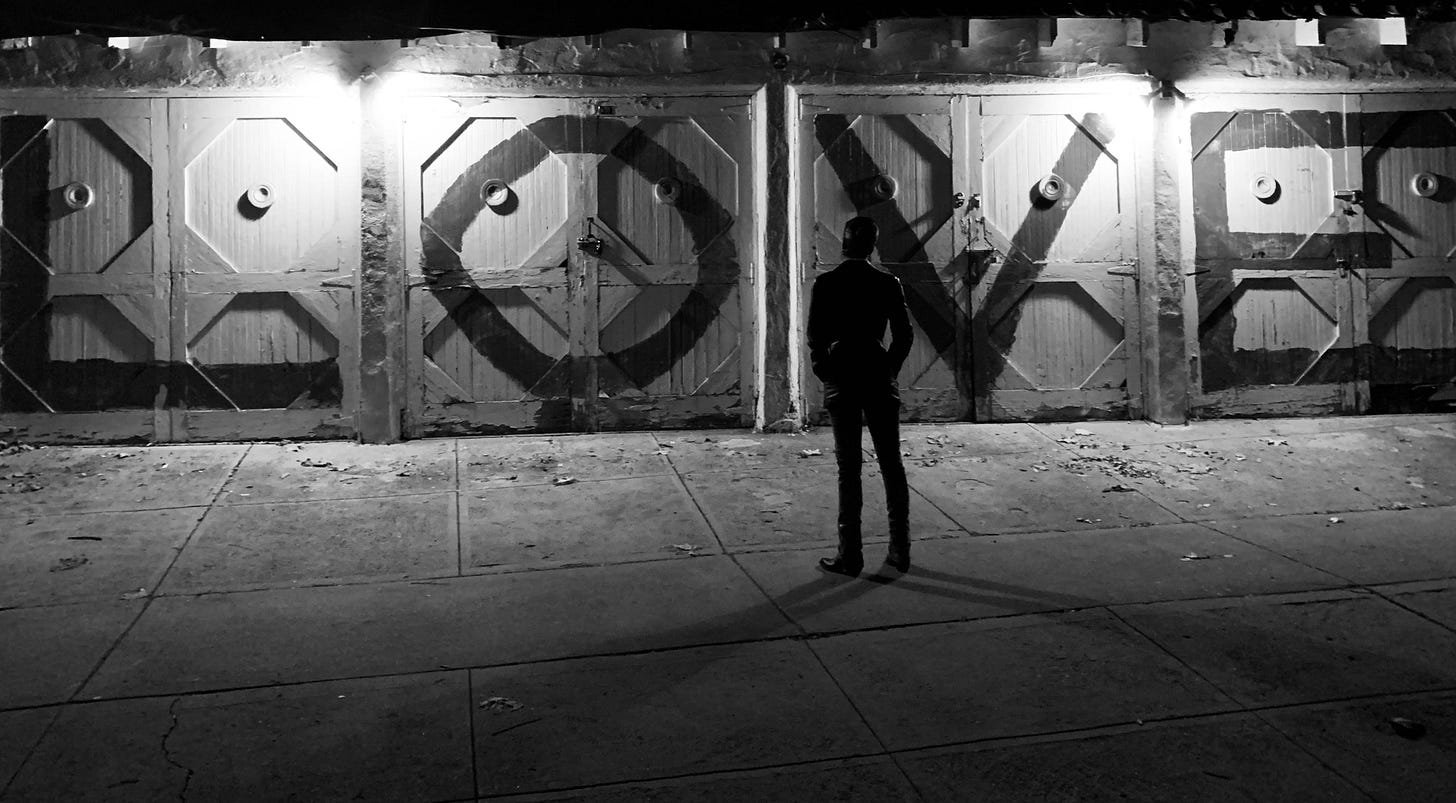Manifesting & Philosophy: The Ethics of Belief, Self-Help, and Dating (again)
I always stumble upon things that are perfect for me. Listen to the voiceover to read along with me.
I believe what is meant for me will come to me. When looking for source material for one topic, I find amazing material on another topic that resonates with me and speaks to exactly what I’m looking for. I always pick the best seat to reserve at the movie theater. When I watch a random movie, more often than not, if they say the date in the movie it's the same date as when I’m watching it. Or the movie showcases the exact feelings or issues I’m dealing with at that time and makes me confront those feelings cathartically or shows me a way to navigate those feelings. What is meant for me really does come to me. (I’m sorry, I hate to brag!)
But I think the universe likes to throw me a bone because I, 1) believe in myself and 2) I manifest. Not to get all hippie... Only a couple of years ago did I find out that since I was a child, my immediate family — my mom, dad & sister — had a bet going as to see who could guess at what age I would go “full hippie.” When I found this out I was offended! I’ve always been very much a trendsetter & hip, maybe a bit earthy, but a hippie? No way. I didn't ask who guessed what age, I was too upset. I stormed away from the conversation, stomping away in the farthest direction possible in my Doc Martens and thrift-ed overalls. The bag that I made out of recycled denim clanked over my shoulder while I stormed off. The sound came from my moon water in its recycled jar that banged against my weed tin, which tumbled around within a mix of loose tarot cards & organic tampons. I got home and journaled about it. Later, I shook a mason jar vigorously to make homemade butter to go with the bread I made from scratch. (I don't trust the chemicals in the store-bought bread) As I cut the bread to accompany the pesto made with basil from my garden, I wondered....how could they think I was a hippie? I reheated some espresso in my Italian Moka pot (I refuse to own a microwave), I needed to think this through over coffee. After I threw the coffee grounds away in my compost, I thought...I wonder who won the bet?
But in all seriousness...
Did you know that philosophers were into manifesting? I’m going to try to break down some philosophy here, so bear with me. I saw the idea of manifesting emerge before it was referred to as such in the debate about the “ethics of belief”. The “ethics of belief” refers to a cluster of questions at the intersection of epistemology, ethics, philosophy of mind, and psychology.”1 The big question at the center of it is: are there are social norms that hinder our habits of belief? Psychiatrist and philosopher William James would ask, is it wrong or impractical to believe or not believe something without sufficient evidence for it? Should we only believe in things we have sufficient evidence for, and is it wrong to withhold our belief until there is enough evidence?
Andrew Chignell gives examples of a kind of norm in his breakdown of “Ethics of Belief”. The example that I think most people are familiar with is: “someone who reads in the psychological literature that people are much more likely to survive a cancer diagnosis if they firmly believe that they will survive it.”2 William James refers to cases such as these as “where faith in a fact can help create the fact”3 Chignell goes on to say, “someone might suggest that the patient's knowledge that his ‘faith helps create the fact’ itself counts as a kind of evidence in its favor.”4
“THE FAITH CAN HELP CREATE THE FACT”
That’s manifesting in philosopher speech, baby. And if the philosophers believe in manifesting, then I don't want to hear any bull about it being hippie-like or “woo-woo”, it's academic, it’s philosophic. I understand that for a lot of people, seeing is not justification for belief, they have to experience something to believe. But this philosophy is saying just the opposite. In order to see something, you have to believe in it. I’ve had doubts about the choices I’ve made in my life, but I found that when I put all of my faith into something, it yields the best results.
For example, last summer I was looking for a job. I had probably $200 in my bank at the time. I had interviews scheduled at two different collegiate institutions. I got an offer at one, which was not close to the rate of pay I wanted. The other job was going to pay me more and had much better benefits, but still required me to do 2 more rounds of interviews over the next 4 weeks. I was running out of money quickly. I wanted that higher-paying job, and I knew I could get it. I had to have faith. So I declined the first offer. After 6 weeks, writing in my journal 50 million times “I will get the job” and some credit card debt later, I got the higher paying job, just like I knew I would. Was it impractical for me to turn down a job when I had no money? YES! But do I believe in myself and that I can get anything I want? Yes! & In hindsight, I’m glad I didn’t take that lower-paying job because the staff went on strike about 5 months later, and only reached a tentative agreement 3 weeks ago (as of writing this on Jan 9th).
There’s an episode in season 5 of Sex in the City where the girl group is at a bookstore. Charlotte, the waspy obsessed with marriage one, shamefully ventures over to the self-help section of the bookstore. At the last minute, upon seeing a crying woman on the floor of the section, Charlotte chickens out on picking up “Starting Over Yet Again” and pretends she’s lost. Although she can’t bring herself to buy the book in person, she still is interested in helping herself and she ends up ordering the book online to avoid public shame.
I had that same feeling of shame when I clicked on Jillian Turecki’s podcast channel, Jillian on Love. I always thought I’m self-aware, I know myself, it’s not going to tell me anything I don’t already know. But I’ve seen some of Jillian’s videos and usually like what she’s saying, so I thought I’d give it a listen. Jillian, a relationship coach and writer with 20 years of experience, gives off the comforting vibe of a middle school English teacher with a soft voice to match.
Again, I always find the right things at the right time. I scrolled through the plethora of episodes and saved a random episode that really resonated with me. The episode was “The 5 Biggest Dating Mistakes and How to Avoid Them”. The first mistake that blocks the potential for healthy committed relationships is rushing.
I like to cut right to the case with people. I don’t love small talk, it used to be painful for me, but now that my day job is in corporate academia in America, I've gotten much better at it. I like to ask people, but typically men, “When was the last time you cried”. And oh boy, has this backfired! Sometimes I get wayyyyy to personal of an answer wayyyy to quickly. One time a guy responded to my inquiry with “What are you my therapist?” Okay then….
So maybe I’ll stop doing that, (per Jillian’s advice only, but I think it’s a good question to weed out men engrossed in toxic masculinity). But I bring that up to say that I do not like to connect superficially, especially if it’s with someone that I feel like I’m going to hit it off with, friend or potential partner. I didn’t want to do the arduous work that Jillian insists on when it comes to dating: taking things slow, not going on 8-hour-long dates, not playing house right away. There is inherent uncertainty with dating, and who wants to live in uncertainty?
I think a lot of the struggle of grappling with the inherent uncertainty of dating comes from feeling like everything is written on our faces. We think we’re so obvious when it comes to showing people how we feel and then we’re confused when they don’t get it. Like there’s a big red arrow and blinking lights over our heads. I’m reminded of the Ashley Simpson song, “Pieces Of Me”. One verse goes, “Am I that obvious? And if it's written on my face, I hope it never goes away.”
We all want someone to be able to read us and everything that’s written on our face, but we have to learn how to read. You didn't come out of the womb literate. You’re not going to meet someone right away and think they’ll know how to read you and vice versa. In a relationship, time, patience, practice, and communication with one another are how you get to the place of expert-level literacy. And for those of us who are metaphorically dyslexic in that department, it might take some extra time. (I actually am dyslexic, so imagine my struggles).
I know all this, and yet I still tend to rush. I’m trying to practice what I preach, but I can at least say I only rush in my daydreams. In my actions on Earth, it’s like I’m trying to run underwater, I’m forced to take it slow.
When you come face to face with love, what do you do?
Jillian says we get caught up on the adrenaline of it all, the adrenaline of attraction or the adrenaline of meeting someone you actually like after consecutive duds. It was then, maybe 5 and a half minutes into the episode, is when I resigned myself to Jillian. Declaring she might be a prophet. I realized, oh shit, maybe I do have something to learn from this. She encourages boundaries and to make sure your actions reflect those boundaries. If you say you want something serious and committed, then you have to be honest with yourself and follow through on those boundaries with your actions. Which makes me think, how do we stop bypassing our own boundaries?
And I mean that in many different types of relationships. I’ve lost myself in friendships by bypassing my boundaries for that other person. With a romantic relationship, Jillian says that could mean waiting before playing house with someone, waiting to have sex with them, and trying to slow down on that “need for now”. Taking it slow allows for the potential for a deeper connection to blossom. Modern American philospher Neil Delaney believes that “in building up a shared history with one another, people can come to secure the lasting significance to each other that they look for in their romantic relations.”5 The creation of this shared history should not go underappreciated. Delaney goes on to talk about “physical delight” —meaning sex, but he never explicitly says sex— how the physical delight we’re hoping to feel does not come from “physical fineness, but rather from the continual satisfaction of desires to achieve deep interpersonal closeness through movements, gestures, and expressions.”6 But I think if their “physical fineness” is off the charts then it’s okay. (I’m joking)
I won’t cover everything Jillian talks about. Just go listen to the podcast. But the second mistake she talks about is the fact that people do not communicate; communicate on their boundaries and their expectations. Something I talked about in my Nietzsche essay
is being vulnerable and trying to fight the fear that comes with being vulnerable in order to find a deeper, all-consuming connection. And Jillian brings up some of the same ideas; you have to try to “bypass that threshold of fear” in order to reach your goal.
To know passion was to break the bonds of the frightened, ignorant self. There might, of course, be a price to pay. One might be risking the shelter of respectability if one fell in love with the wrong person, but in return for such loss one would be gaining the only knowledge worth having. The very meaning of human risk was embedded in the pursuit of love... Today, there are no penalties to pay, no world of respectability to be excommunicated from. Bourgeois society as such is over.
-Vivian Gornick, 1997. "The End of the Novel of Love."
To bypass the fear is “to know passion”, you have to be willing to break those bonds in order to reach the reward. Although it’s a risk to put yourself out there, what do you have to lose? No one will exile you, you won’t be ridiculed in the town square (but be warned, if you’re a dick someone might post on the internet about it and you might get canceled. so just don’t be a dick). When you pass the threshold of fear that shelters you, you’re able to “gain the knowledge worth having”: a better understanding of self and a better understanding of who you want in a partner.
Jillian also talks about the importance of knowing what you want out of a person. I believe that you have to show up to someone with intention. In the past, I've started relationships with really poor intentions, and guess what happened? It totally collapsed and I was the one that got hurt the most. It reminds me of the time in high school when I tried to put a hex on a boy who did me wrong. I lit all the candles, focused in on my witchy-ness, and said the spell. But the spirits do not like manipulative harmful magic. The spell worked but it backfired and I basically ended up hexing myself. I was sick for two weeks. Poor intentions yield poor results, I had to learn that the hard way.
So how do you figure out what you want? Well, go out, go on dates, meet people, experience the world, and you’ll find out real quick. If you don’t want to do that, or can’t do that, I found it’s easier to figure out what you DON’T want, and then work by elimination. Once someone told me, “If you ask someone what they want to eat and they don't know, ask them what they don’t want and work backward.” Jillian says to write down what you want in a long-term partner, be clear about it, and define it. This is when I got all snooty, after feeling like a dog being scolded for the majority of the episode (in a good way, I thought I knew it all and I like being proven wrong because who wants the burden of knowing it all). But I felt like an A+ student because I already had a list written down!
I have a list of 81 (and counting) points of what I want out of a long-term partner. I printed it out and taped it into my journal. Some points are as general as “must live in the city I live in” or “weird, but not weirder than me”. Some are more specific like: “takes the initiative toward the emotional labor of our relationship” or “values affection without thinking about what they’ll get out of it”.
Personally, and I know this is controversial, I believe in soulmates. No one is going to be able to convince me otherwise. So I think back to William James and the Ethics of Belief…Is it impractical for me to believe in something without sufficient evidence for it? No, William James would be screaming “Yes girl! Believe in that soulmate!” Because I believe it, it will come true. Like James said, “Faith helps create the fact”. So manifest, believe in what you want, and write it down. You can’t have any shadow of a doubt. Because if you don’t fully believe in it, then why should it come true?
Chignell, Andrew, "The Ethics of Belief", The Stanford Encyclopedia of Philosophy (Spring 2018 Edition), Edward N. Zalta (ed.). <https://plato.stanford.edu/archives/spr2018/entries/ethics-belief/>.
Chignell, Andrew, "The Ethics of Belief", The Stanford Encyclopedia of Philosophy (Spring 2018 Edition), Edward N. Zalta (ed.), Section 2.1 <https://plato.stanford.edu/archives/spr2018/entries/ethics-belief/>.
James, William, 1896 [1956], The Will to believe and other essays in popular philosophy, New York: Dover Publications, 1–31, pg.25
Chignell, Andrew, "The Ethics of Belief", The Stanford Encyclopedia of Philosophy (Spring 2018 Edition), Edward N. Zalta (ed.), Section 2.1 <https://plato.stanford.edu/archives/spr2018/entries/ethics-belief/>.
Delaney, Neil. “Romantic Love and Loving Commitment: Articulating a Modern Ideal.” American Philosophical Quarterly 33, no. 4 (1996): 346. http://www.jstor.org/stable/20009874.
Delaney 347





